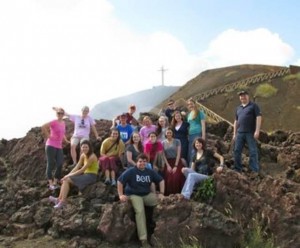Nicaragua: Let us work together
Compiled by Jennifer Davis, Senior John Carroll University
“If you have come here to help me, you are wasting your time. But if you have come because your liberation is bound up in mine then let us work together.”
This past January a group of John Carroll University students and staff traveled to Nicaragua on an immersion trip. The trip was focused on the issues of free trade and fair trade. Throughout the trip the group was welcomed into the families of Nicaraguans for homestays in Batahola and Miraflor. After their experience the students were asked to reflect on and answer the question, “what does solidarity mean to you?”
Kari Grove: Solidarity to me means mutual relationships. It means being men and women WITH others, not for others. For I am no better then the people we lived with in Nicaragua, so how can I just be for them, when in so many ways they are for me and have taught me more than I could ever give them. Solidarity is realizing that my liberation is wrapped up in the liberation of the poor. It is sacrificing my luxurious lifestyle so that I can live in friendship with the poor & give the poor dignity through my friendship. Solidarity is choosing to live in places like Miraflor, so that I can feel the love of the poor & learn so many lessons from them, while choosing to give my love right back to them. Solidarity is realizing the connectedness of human beings and refusing to live in a way that puts you above the poor. For we are in no way above them.
Kateri Dillon: Our host mother taught her one and a half year old nephew, Lester, to call us “tia,” meaning aunt. She’d been breaking off little strips of tortilla to feed Lester, and when he toddled expectantly over to me, she nodded an invitation for me to do the same. As I tore the plain but warm tortilla to place in his tiny hand, I had an overwhelming sense that we were sharing in something sacred, something life-bearing and infinitely greater than language, geography, finance, culture, and everything else society uses to tell us we can’t truly be one family. And in that moment, I was Lester’s aunt. Solidarity is breaking bread together under the same roof – often bread in the form of tortillas.
Jennifer Davis: When I think of solidarity, I think of one moment in particular. It was towards the end of our trip, when we had a reflection. We sat in a circle and we opened with a prayer. After a little bit of shy silence, people started talking about how there was this hurt that they kept feeling. No one knew how to describe it, they just said that it hurts, “right here” pointing to the middle of their ribcage, somewhere around their stomach. I didn’t say much in that reflection, but I knew exactly what hurt they were talking about. I think that, in a way, that might be what solidarity is: feeling so connected to other people––much a part of a part of their family––that you can’t help but hurt when you see that they are not treated with respect and dignity by the rest of the world. You don’t hurt only out of compassion or pity, but out of a profound empathy. You feel for them because you are with them. Solidarity is acknowledging the dignity of those who’s dignity has been ignored, and demanding that others recognize it too.
Mary Lutter: After knowing the people of Nicaragua as family, I cannot act in ways that I know will hurt them or other people in situations like theirs. Solidarity is loving people entirely, and letting that love impact our decisions every day. If each of us saw the people in this world as our brothers and sisters instead of strangers, our world would be a lot more just.
Grace Donnelly: In Nicaragua, I found that solidarity is learned through the relationships we built. It was built over meals and through stories. It was built as we broke down language barriers and met as brothers and sisters. Rather than being held back by my poor Spanish skills, I built my closest relationships through nonverbal communication. While I was with my family in Batahola I grew close to my sister Amy. Our language barrier did not stop us from growing close. Our conversations consisted of a pat on the arm, a smile, a mischievous look, or a hug. I have learned that solidarity means the giving and receiving of love regardless of supposed differences.
Solidarity means mutual relationships. It means breaking bread together under the same roof – often bread in the form of tortillas. It means living in friendship with the poor and giving dignity through that friendship. Solidarity means feeling connected to other people, feeling so much a part of their family that you can’t help but hurt when you see that the rest of the world does not treat them with respect or dignity. It means receiving love from the poor and choosing to give love right back. In choosing to live in solidarity, you are loving people entirely, and letting that love impact your decisions every day.
ISN welcomes faith & justice related blog submissions from members of the Ignatian family. Please let us know of any blog ideas or posts using this form: ISN Blog Ideas






Leave a Reply
Want to join the discussion?Feel free to contribute!